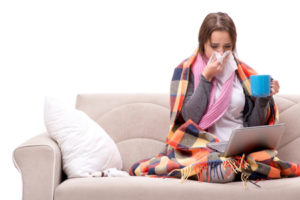Flu season getting you down?
Flu season getting you down?
Does it seem like everyone you know has been sick lately? Coughs and colds seem to be everywhere and the flu this year has been a nasty one. So far this year (as at the 26th of June) there have been 22,730 confirmed cases of Influenza across Victoria. This time last year there had been only 2,555 cases (Victorian State Government. Department of Health and Human Services, 2019). Ooph, bit of a jump! Typically, people associate the flu with being a winter illness in Australia, but this year flu season started earlier than usual with people getting ill here in January.
So, what actually is the flu? Influenza, which we commonly refer to as the flu, is a viral illness that affects the respiratory tract. It is highly contagious and spreads by contact with fluids from coughs and sneezes. This can be either through someone coughing or sneezing near you and you breathing in the droplets, or by an infected person coughing into their hands and then touching a surface that another person then comes into contact with.
The most common symptoms of the flu include:
- A high temperature (over 38ºC) that comes on suddenly
- Aches and pains throughout your body, especially head, lower back and legs
- A dry cough
- Extreme tiredness and lack of energy. It may feel difficult to get out of bed.
People also often report having chills, cold-like symptoms such as sore throat and runny/stuffy nose, achy eyes and a loss of appetite. In an otherwise healthy person, the more acute symptoms may last for around a week followed by another 1-2 weeks of lower levels of energy than usual. The cough may also take a few weeks to clear up. These people are often able to recover from the flu at home with no need to see the doctor as their immune system will kick into gear and overcome the virus. However, certain groups of people are more at risk of complications when it comes to the flu and should seek medical attention. These include children under 5 years of age, pregnant women, Aboriginal and Torres Strait Islander people, people over 65 years of age, and people with chronic medical conditions.
Some symptoms require immediate medical attention. These include:
- sudden dizziness
- chest pain
- fever with a rash
- difficulty breathing
- severe vomiting
- confusion
(Victorian State Government. Department of Health and Human Services, 2018).
The flu is different to the common cold and can have very severe, even life threatening complications. These include pneumonia, bronchitis and dehydration. The flu can also cause complications for preexisting conditions such as heart disease, asthma and diabetes, so for these groups of people it is a good idea to see the doctor for an opinion. Complications are typically more serious in people from the previously mentioned higher risk groups, however the best rule of thumb is if you aren’t sure or are feeling concerned about whether you have the flu, go see your doctor. There’s no harm in getting checked out.
So what can you do to help prevent getting the flu? There is a vaccine available every year in Autumn for people aged 6 months and over. The Victorian government recommends people in high risk groups (eg. those previously mentioned such as people under 5 or over 65 etc), and people who have regular contact with people in high risk groups (eg. parents of children under 5 years) have the vaccine. The other major tip for avoiding the flu is regular hand washing. The flu is spread by contact with droplets from coughs and sneezes so regular hand washing will ensure that those with the flu aren’t unwittingly spreading it to the things they touch, and those who don’t have it avoid picking it up after touching infected surfaces. Coughing into your elbow and not your hands is another key way to avoid transferring the virus to the things you touch. And of course, the biggest tip to avoid spreading the flu is if you are sick, stay home! It is highly contagious so to stop the spread, stay away from other people while you aren’t well.
If you do happen to get the flu, then make sure to rest, rest and rest some more. Coupled with fluids, and more fluids! It is very important to avoid dehydration so adequate fluid intake in whatever form you can tolerate is a good idea. Chicken soup, water, hydralyte, fruit, or even the ol’ jelly and icy poles if that’s all you can get down will all do the trick to avoid getting dehydrated.
Hopefully you manage to avoid catching the flu this year. If you do happen to get it and need advice about which medications might be helpful or if you need your symptoms assessed please see your doctor. If you have recovered from being unwell and aren’t sure how best to spring back into action, (or even if those body aches and pains have nothing to do with the flu!) why not come in and see one of our friendly, professional physiotherapists here at Hoppers Physio. Whether you need a bit of hands on treatment for your body or some guidance with exercises, our team are here to help! Call us on (03) 9749 5110 for appointments.
References
Victorian State Government. Department of Health & Human Services. (2018). Flu (influenza). Retrieved from https://www.betterhealth.vic.gov.au/health/conditionsandtreatments/flu-influenza
Victorian State Government. Department of Health & Human Services. (2019). Surveillance of notifiable conditions in Victoria. Retrieved from http://www.health.vic.gov.au/ideas/downloads/daily_reports/rptVS_SNIDSVictorianSummary_GR.pdf

